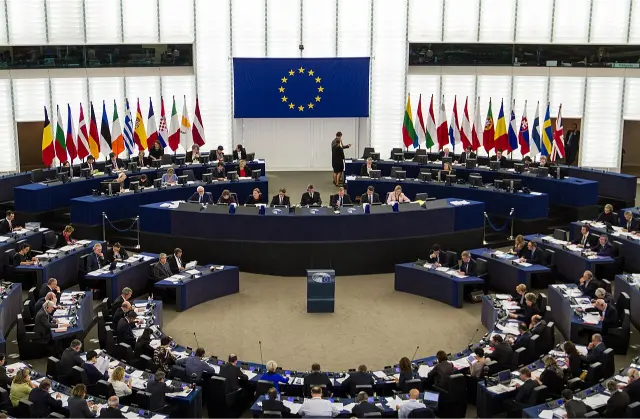The European Union has approved a new set of sanctions against Russia, notably including companies from mainland China in its measures for the first time, targeting those suspected of aiding the Kremlin in obtaining prohibited items.
These sanctions, focused on preventing the circumvention of restrictions, are aimed at entities worldwide that supply Russia with advanced technology and military goods, especially components for drones.
Among the sanctioned are three companies from mainland China—Guangzhou Ausay Technology Co Limited, Shenzhen Biguang Trading Co Limited, and Yilufa Electronics Limited—and one from Hong Kong, RG Solutions Limited.
These firms are among 193 entities listed in the latest sanctions round, which also features companies from Turkey, Kazakhstan, North Korea, and India, increasing the total number of blacklisted entities to almost 2,000.
The sanctions package does not include individuals allegedly involved in the death of Alexei Navalny or tighter restrictions on aluminum, reflecting ongoing divisions within the EU on these issues. The details of the sanctions will be disclosed upon their publication in the EU’s official journal, expected later this week. Ursula von der Leyen, president of the European Commission, emphasized the need to continue undermining “Putin’s war machine.”
The EU’s decision marks a significant step, given previous hesitations due to complaints from Beijing and reluctance from certain member states. However, the growing relationship between Russia and China led to a renewed effort to include Chinese firms in the sanctions. Hungary, while not blocking the package, expressed disagreement with the measures, as stated by Hungarian Foreign Minister Peter Szijjarto, who remarked that “the EU is making the wrong decision.”
The sanctions come as Russia-China trade hit a record high of over $240 billion in 2023, surpassing their $200 billion trade goal. Additionally, this 13th package of EU sanctions since February 2022 addresses Russian institutions involved in the re-education of children abducted from Ukraine, an act that has led to an International Criminal Court arrest warrant against President Vladimir Putin for war crimes.
The timing of the sanctions’ approval was intended to coincide with the second anniversary of the war in Ukraine, although the process faced delays due to Hungary’s resistance to any measures affecting Rosatom, Russia’s nuclear energy giant. Despite these challenges, the EU managed to approve the sanctions ahead of the symbolic two-year mark of the Russian invasion, underscoring the bloc’s ongoing commitment to responding to the conflict
In a significant development highlighting the growing military cooperation between Iran and Russia, Tehran has reportedly provided Moscow with a substantial quantity of powerful surface-to-surface ballistic missiles.
According to several sources, the transfer includes around 400 missiles, including variants from the Fateh-110 family, such as the Zolfaghar.
The Fateh-110 missiles are known for their short-range capabilities, with the Zolfaghar capable of striking targets between 300 and 700 kilometers (186 and 435 miles) away. This move signals a significant deepening of military ties between the two countries, both of which are subject to sanctions by the United States.
The move raises concerns among Western powers about the implications of the increased military cooperation between Tehran and Moscow, particularly given Iran’s status as a regional power with influence in various conflict zones.
In a move that deepens ties between Russia and North Korea but violates United Nations sanctions, Putin has gifted North Korean leader Kim Jong Un a Russian-made car. Pyongyang’s state media reported this gesture, highlighting it as a sign of the strong personal relationship between Putin and Kim. The Kremlin’s chief spokesperson, Dmitry Peskov, disclosed that the vehicle is a version of the Aurus limousine, a luxury model used by Putin himself, which Kim admired during his visit to Russia’s Far East in September for a summit.
This act of gifting a luxury vehicle contravenes UN sanctions, which Russia had approved, prohibiting the import of luxury goods into North Korea due to its nuclear and weapons programs. Since Kim’s visit to Russia, the two nations have been moving closer, with recent events including the first group of Russian tourists visiting North Korea since pandemic-related border closures. Additionally, accusations have been made by the U.S. and South Korea against North Korea for supplying weapons to Russia for the conflict in Ukraine, in return for Russian assistance with North Korea’s satellite endeavors.
Plans for Putin to visit Pyongyang have been hinted at by both countries, further indicating the strengthening relations between Russia and North Korea. Kim Jong Un’s preference for luxury cars is well-documented, with previous sightings in high-end vehicles such as Lexus SUVs and Mercedes-Benz S-Class. This recent gift from Putin underscores the growing alliance between the two nations despite international sanctions.
South Korea said it had assessed that the gift from Putin, which it classed as a luxury vehicle and a gift to Kim as head of state, was a violation of U.N. sanctions.
“We condemn North Korea for its brazen attitude of publicly disclosing violations of the U.N. sanctions,” a ministry official said. “Russia should also be aware of its responsibility as a permanent member of the U.N. Security Council and stop an act that undermines international norms.”
